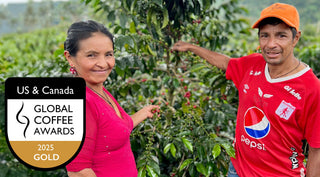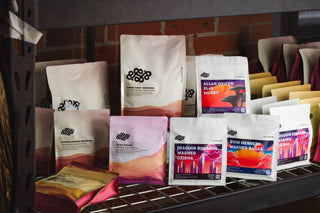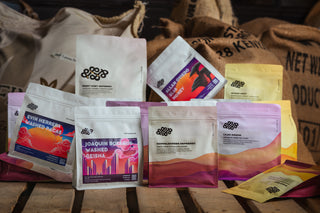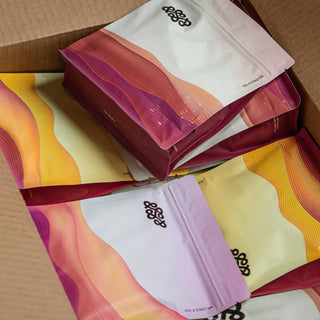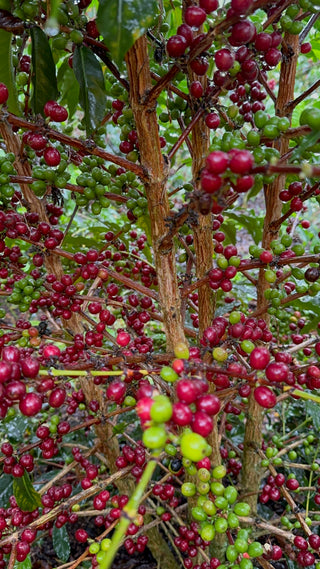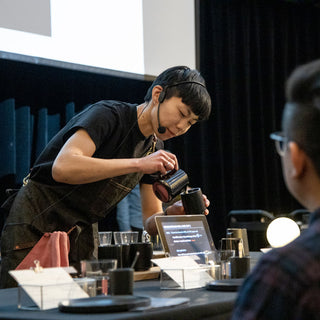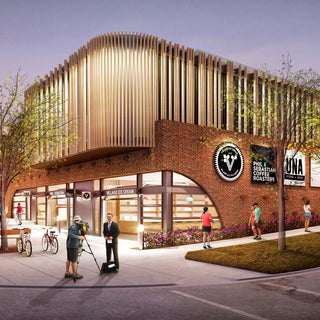By Phil
January 2017 marked my 7th year traveling to Africa to buy coffee, and although I’m now quite comfortable traveling in Ethiopia and Kenya, I feel like I’m still just scratching the surface of understanding coffee in these two dynamic countries. The potential in both countries is so enormous – it’s simply astounding. But really I shouldn’t be grouping Ethiopia and Kenya together. The truth is that, although the coffee from both countries is dynamic, exotic and some of the best on the planet, the countries are worlds apart.
Ethiopia
Tourism in Ethiopia is far less developed than Kenya. During my time there, the travelers I cross paths with are always there on business. All kinds of business—from NGOs to United Nations, and other coffee buyers, of course! I enjoy chatting with strangers in the 3-hour line to acquire a visa upon arrival. I meet the most interesting people. This year it was a man from Switzerland, and it was his 45th visit to Ethiopia. He worked for an NGO providing clean water in rural areas. A noble cause to be certain, but most entertaining was his explanation that I should do my currency exchange on the black market to get better rates. Like I said…interesting!
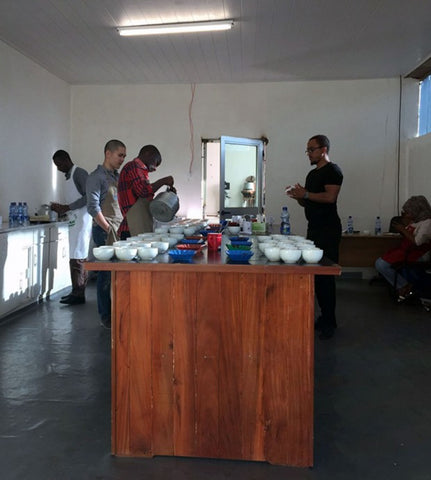
But I digress, back to coffee. During the last year, Ethiopia has been in a state of political unrest. The apex of this unrest occurred in early October last year, just as the coffee harvest was beginning. During that time, washing stations were burnt to the ground and many people were injured and even killed. Although protests occurred all over the country, attacks on coffee facilities were worst in the south part of the Oromia region. By the time I arrived in Addis mid-January, the protesting had subsided, so I didn’t observe it first-hand. It probably comes as no surprise that this unrest affected quality, and it was exacerbated by very hot and dry weather after the harvest. The consequence I saw on the ground is that the coffees from the south were reduced in quality as compared to other years.
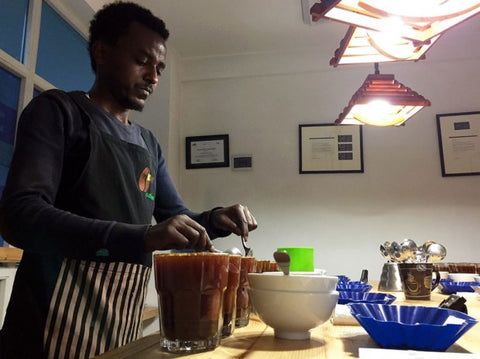
During my visit to Ethiopia, I parked myself in Addis Ababa and tasted coffees every day for a week. In all, I tasted about 300 coffees and finally honed in on some good quality lots from the west, near the town of Jimma. I’m in the process of sampling and buying those lots now. Wish me luck!
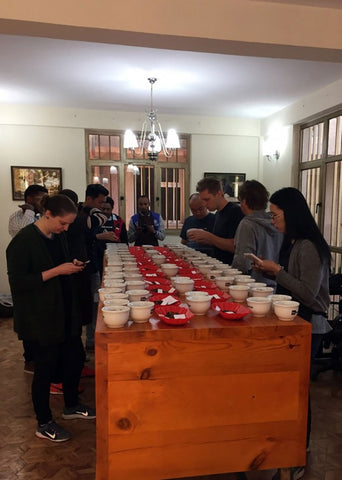
Kenya
In contrast to Ethiopia, Kenya has a very developed tourism economy. During every visit, especially when staying in Nairobi, the hotels I frequent are filled with vacationers from all over the world, preparing to head out on safari. Generally, most of my own time in Kenya is all business, but I have brushed up against the well-oiled machine of tourism, and stayed a few nights at safari hotels. On this trip, while upcountry in Nyeri County, I joined the droves of tourists and spent one night inside a game park at a hotel called “The Ark”. I only had a few hours of daylight there between the day and night, but it was enough to whet my appetite while not taking too much time away from my focus: coffee. I can’t wait to bring my family back, just as soon as my kids are old enough!
Most of my time in Kenya this year was graced by the presence of two lovely individuals, Klaus Thompson and Astrid Gulstad from the Coffee Collective in Denmark. Their humor, candor, and unique perspectives made for scintillating conversation on topics ranging from coffee to feminism.
On the 2nd day of my visit Klaus, Astrid and I visited the Coffee Research Institute. I had been meaning to visit there for many years, but thanks to Klaus’s initiative, I finally made it happen. We only spent 3 or 4 hours there, but wow was it informative. We talked about the history of Kenya SL28 and SL34 varieties, which was very interesting. And then I was introduced to Mr. Joseph Mburu, a soil chemist and plant nutritionist – I was enthralled. The depth of his knowledge on soil and plant nutrition is astounding, rooted in both scientific knowledge and practical experience. He talked about soil testing, analysis, and optimal inputs regiments. He interlaced this complex science with a dash of wit, making an already engaging conversation even more amusing. Also involved in the conversation was a man named Uche Kiagwa, who happened to be visiting the Institute at the same time. Uche is a farmer who’s pursuing the noble endeavor to grow coffee 100% organically, or should I say biologically. This is something that neither Klaus nor I have ever seen in Kenya. I later visited Uche’s farm, and I was wowed by his passion and thirst to learn and improve. Look for great things from Uche one day as his trees grow older and bear a full harvest.
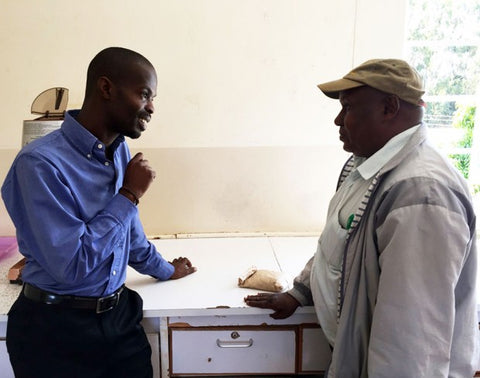
Later in the week, I visited the Othaya Society dry mill and cupping lab. There I met-up with cupping lab director, David Wairagu, whom I met last year. David was a gracious host. He set up tastings for me and later took me around to visit a few of the factories (wet mills).
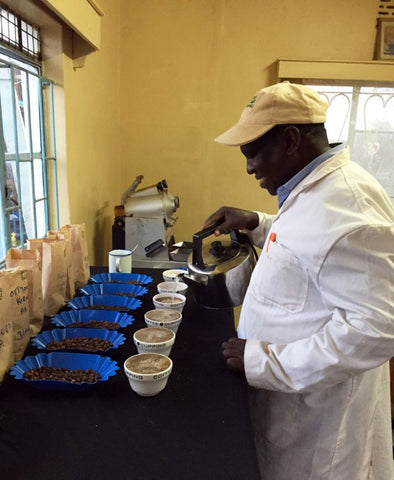
In addition to being just a fine gentleman, David is an expert sample roaster, and a number of the coffees really shone on the cupping table. From those, and a later cupping back at the KCCE office in Nairobi, I made our selections for the year.
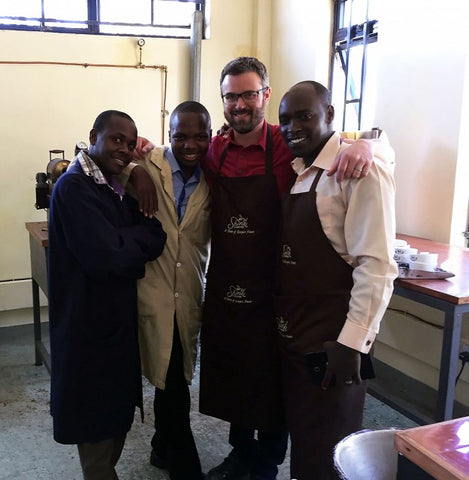
Click to shop our selection of current Ethiopian and Kenyan offerings
Best,
Phil

